SOLOSEC- secnidazole granule
SOLOSEC by
Drug Labeling and Warnings
SOLOSEC by is a Prescription medication manufactured, distributed, or labeled by Lupin Pharmaceuticals, Inc., LUPIN INC., Catalent Pharma Solutions, LLC, Ropack Inc.,, Catalent Pharma Solutions, LLC, KY. Drug facts, warnings, and ingredients follow.
Drug Details [pdf]
-
HIGHLIGHTS OF PRESCRIBING INFORMATION
These highlights do not include all the information needed to use SOLOSEC® safely and effectively. See full prescribing information for SOLOSEC.
SOLOSEC® (secnidazole) oral granules
Initial U.S. Approval: 2017
INDICATIONS AND USAGE
SOLOSEC® is a nitroimidazole antimicrobial indicated for the treatment of bacterial vaginosis in adult women. (1)
To reduce the development of drug-resistant bacteria and maintain the effectiveness of SOLOSEC and other antibacterial drugs, SOLOSEC should be used only to treat or prevent infections that are proven or strongly suspected to be caused by bacteria.
DOSAGE AND ADMINISTRATION
- Administer a single 2-gram packet of granules once orally, without regard to the timing of meals. (2.1)
- Sprinkle entire contents of packet onto applesauce, yogurt or pudding and consume all of the mixture within 30 minutes without chewing or crunching the granules. A glass of water may be taken after the administration of SOLOSEC to aid in swallowing. (2.2)
- SOLOSEC is not intended to be dissolved in any liquid. (2.2)
DOSAGE FORMS AND STRENGTHS
Oral granules: 2 g secnidazole, in a unit-of-use child-resistant foil packet. (3)
CONTRAINDICATIONS
History of hypersensitivity to secnidazole, other ingredients of the formulation, or other nitroimidazole derivatives. (4)
WARNINGS AND PRECAUTIONS
- Vulvo-vaginal candidiasis may develop with SOLOSEC and require treatment with an antifungal agent (5.1)
- Potential Risk for Carcinogenicity: Carcinogenicity has been seen in mice and rats treated chronically with nitroimidazole derivatives, which are structurally related to secnidazole. It is unclear if the positive tumor findings in lifetime rodent studies indicate a risk to patients taking a single dose of SOLOSEC to treat bacterial vaginosis. Avoid chronic use (5.2)
ADVERSE REACTIONS
Most common adverse reactions observed in clinical trials (incidence ≥ 2%) were vulvo-vaginal candidiasis, headache, nausea, dysgeusia, vomiting, diarrhea, abdominal pain, and vulvovaginal pruritus. (6.1)
To report SUSPECTED ADVERSE REACTIONS, contact Lupin Pharmaceuticals, Inc. at 1-844-SOLOSEC (1-844-765-6732) or FDA at 1-800-FDA-1088 or www.fda.gov/medwatch
USE IN SPECIFIC POPULATIONS
Lactation: Breastfeeding is not recommended. Discontinue breastfeeding for 96 hours after administration of SOLOSEC. (8.2)
See 17 for PATIENT COUNSELING INFORMATION and FDA-approved patient labeling.
Revised: 10/2019
-
Table of Contents
FULL PRESCRIBING INFORMATION: CONTENTS*
1 INDICATIONS AND USAGE
1.1 Bacterial Vaginosis
1.2 Usage
2 DOSAGE AND ADMINISTRATION
2.1 Recommended Dosage
2.2 Instructions for the Preparation and Administration of SOLOSEC
3 DOSAGE FORMS AND STRENGTHS
4 CONTRAINDICATIONS
5 WARNINGS AND PRECAUTIONS
5.1 Vulvo-Vaginal Candidiasis
5.2 Potential Risk for Carcinogenicity
5.3 Drug Resistance
6 ADVERSE REACTIONS
6.1 Clinical Trials Experience
6.2 Postmarketing Experience
7 DRUG INTERACTIONS
7.1 Oral Contraceptives
8 USE IN SPECIFIC POPULATIONS
8.1 Pregnancy
8.2 Lactation
8.4 Pediatric Use
8.5 Geriatric Use
11 DESCRIPTION
12 CLINICAL PHARMACOLOGY
12.1 Mechanism of Action
12.2 Pharmacodynamics
12.3 Pharmacokinetics
12.4 Microbiology
13 NONCLINICAL TOXICOLOGY
13.1 Carcinogenesis Mutagenesis & Impairment of Fertility
14 CLINICAL STUDIES
16 HOW SUPPLIED/STORAGE AND HANDLING
17 PATIENT COUNSELING INFORMATION
- * Sections or subsections omitted from the full prescribing information are not listed.
-
1 INDICATIONS AND USAGE
1.1 Bacterial Vaginosis
SOLOSEC is indicated for the treatment of bacterial vaginosis in adult women [see Use in Specific Populations (8.1) and Clinical Studies (14)].
1.2 Usage
To reduce the development of drug-resistant bacteria and maintain the effectiveness of SOLOSEC and other antibacterial drugs, SOLOSEC should be used only to treat or prevent infections that are proven or strongly suspected to be caused by susceptible bacteria. When culture and susceptibility information are available, they should be considered in selecting or modifying antibacterial therapy. In the absence of such data, local epidemiology and susceptibility patterns may contribute to the empiric selection of therapy.
-
2 DOSAGE AND ADMINISTRATION
2.1 Recommended Dosage
The recommended dosage of SOLOSEC is a single 2-gram packet of granules taken once orally, without regard to the timing of meals [see Clinical Pharmacology (12.3)].
2.2 Instructions for the Preparation and Administration of SOLOSEC
- Open the SOLOSEC packet by folding over the corner (marked by an arrow) and tearing across the top.
- Sprinkle the entire contents of the SOLOSEC packet onto applesauce, yogurt or pudding [see Clinical Pharmacology (12.3)]. The granules will not dissolve. Consume all of the mixture within 30 minutes without chewing or crunching the granules. A glass of water may be taken after the administration of SOLOSEC to aid in swallowing.
- The granules are not intended to be dissolved in any liquid.
- 3 DOSAGE FORMS AND STRENGTHS
- 4 CONTRAINDICATIONS
-
5 WARNINGS AND PRECAUTIONS
5.1 Vulvo-Vaginal Candidiasis
The use of SOLOSEC may result in vulvo-vaginal candidiasis. In controlled clinical trials of non-pregnant women with bacterial vaginosis, vulvo-vaginal candidiasis developed in 19/197 (9.6%) of subjects who received 2 g SOLOSEC and 4/136 (2.9%) subjects who received placebo [see Adverse Reactions (6.1)]. Symptomatic vulvo-vaginal candidiasis may require treatment with an antifungal agent.
5.2 Potential Risk for Carcinogenicity
Carcinogenicity has been seen in mice and rats treated chronically with nitroimidazole derivatives which are structurally related to secnidazole. It is unclear if the positive tumor findings in lifetime rodent studies of these nitroimidazoles indicate a risk to patients taking a single dose of SOLOSEC to treat bacterial vaginosis. Avoid chronic use of SOLOSEC [see Nonclinical Toxicology (13.1)]
-
6 ADVERSE REACTIONS
6.1 Clinical Trials Experience
Because clinical trials are conducted under widely varying conditions, adverse reaction rates observed in the clinical trials of a drug cannot be directly compared to rates in the clinical trials of another drug and may not reflect the rates observed in practice.
The safety data described below reflect exposure to 589 patients, of whom 518 received a 2 g dose of SOLOSEC. SOLOSEC was evaluated in three clinical trials of patients diagnosed with bacterial vaginosis: two placebo-controlled trials (Trial 1 n=215, Trial 2 n=189) and one uncontrolled safety trial (Trial 3 n=321).
All patients received a single oral dose of study medication or placebo. Trial 1 evaluated a 1 g (this dose is not approved) dose (n=71) and a 2 g dose (n=72) of SOLOSEC. Trial 2 evaluated a 2 g dose (n=125). The population was female, aged 15 to 54 years. Patients in the placebo- controlled trials were primarily Black or African American (54%) or Caucasian (41%).
There were no deaths in the trials. Two patients in Trial 3 discontinued due to vulvovaginal candidiasis in the SOLOSEC-treated arm.
Most Common Adverse Reactions
Among 197 patients treated with a single 2 g dose of SOLOSEC in the two placebo-controlled trials, Trial 1 and 2, adverse reactions were reported by approximately 29% of patients. Table 1 displays the most common adverse reactions (≥ 2 % in SOLOSEC-treated patients) in these two trials.
Table 1: Adverse Reactions Occurring (≥ 2 % SOLOSEC-Treated Patients) in the Pooled Placebo-Controlled Trials 1 and 2 in Adult Women with Bacterial Vaginosis Adverse Reaction
SOLOSEC
N=197
n (%)
Placebo
N=136
n (%)
Vulvo-vaginal candidiasis
19 (9.6)
4 (2.9)
Headache
7 (3.6)
2 (1.5)
Nausea
7 (3.6)
1 (0.7)
Diarrhea
5 (2.5)
1 (0.7)
Abdominal pain
4 (2.0)
2 (1.5)
Vulvovaginal pruritus
4 (2.0)
2 (1.5)
Among the 321 patients in an uncontrolled trial, Trial 3, adverse reactions were reported in 30% of patients. Vulvovaginal candidiasis (8.4%), nausea (5.3%), vomiting (2.5%) and dysgeusia (3.4%) were the most common adverse reactions reported in this trial.
6.2 Postmarketing Experience
The following adverse reactions have been reported during use of other formulations of secnidazole 2 g outside of the United States. Because these reactions are reported voluntarily from a population of uncertain size, it is not always possible to reliably estimate their frequency or establish a causal relationship to drug exposure.
Reported adverse reactions were nausea, dysgeusia, abdominal pain, headache, and vomiting.
-
7 DRUG INTERACTIONS
7.1 Oral Contraceptives
There was no clinically significant drug interaction between secnidazole and the combination oral contraceptive, ethinyl estradiol plus norethindrone [see Clinical Pharmacology (12.3)]. SOLOSEC can be co-administered with combination oral contraceptives (e.g., ethinyl estradiol plus norethindrone).
-
8 USE IN SPECIFIC POPULATIONS
8.1 Pregnancy
Limited available data with SOLOSEC use in pregnant women are insufficient to inform a drug associated risk of adverse developmental outcomes. In animal reproduction studies, there were no adverse developmental outcomes when secnidazole was administered orally to pregnant rats and rabbits during organogenesis at doses up to 4 times the clinical dose (see Data)
The estimated background risk of major birth defects and miscarriage for the indicated population is unknown. All pregnancies have a background risk of birth defect, loss, or other adverse outcomes. In the U.S. general population, the estimated background risk of major birth defects and miscarriages in clinically recognized pregnancies is 2 to 4% and 15 to 20%, respectively.
Data
Animal Data
In animal reproduction studies, pregnant rats were dosed orally with secnidazole during organogenesis (gestational days 6-17) at 100, 300 and 1000 mg/kg/day, up to 4 times the clinical dose based on AUC comparisons. Animals showed no evidence of adverse developmental outcomes, but maternal toxicity (including reduced body weight gain) was observed at and above 300 mg/kg/day. In rabbits, no evidence of adverse developmental outcomes was observed when oral doses of secnidazole were administered to dams during organogenesis (gestational days 7-20) at doses up to 100 mg/kg/day (about 0.1 times the clinical dose, based on AUC comparisons). Secnidazole was associated with maternal toxicity (reduced food consumption and markedly reduced body weight gain) in dams at 100 mg/kg/day.
In a peri- and post-natal development study in rats, secnidazole was administered at 30, 100 and 300 mg/kg/day from Day 6 of gestation through Day 20 of lactation. Secnidazole was not associated with any adverse effects on gestation, parturition, lactation or on subsequent development of first generation (F1) and second generation (F2) offspring at these doses, equivalent to up to 1.4 times the clinical dose based on AUC comparisons. Maternal toxicity (reduced gestational body weight gain) was evident at doses of 100 mg/kg and above (about 0.3 times the clinical dose based on AUC comparisons).
8.2 Lactation
There is no information on the presence of secnidazole in human milk, the effects on the breast- fed child, or the effects on milk production. Other nitroimidazole derivatives are present in human milk. Because of the potential for serious adverse reactions, including tumorigenicity, advise patients that breastfeeding is not recommended during treatment with SOLOSEC and for 96 hours (based on half-life) after administration of SOLOSEC.
Clinical Considerations
A nursing mother may choose to pump and discard her milk during treatment with SOLOSEC and for 96 hours after administration of SOLOSEC and feed her infant stored human milk or formula.
-
11 DESCRIPTION
The active ingredient in SOLOSEC Oral Granules is secnidazole (also named 1-(2- hydroxypropyl)-2-methyl-5-nitroimidazole and 1-(2-methyl-5-nitro-1H-imidazol-1-yl) propan-2- ol), a nitroimidazole antimicrobial.
The molecular formula of secnidazole is C7H11N3O3, the molecular weight is 185.18 and the chemical structure is:
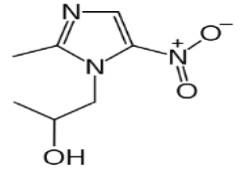
Each packet of SOLOSEC contains 4.8 g of off-white to slightly yellowish granules, which contain 2 g of secnidazole and the following inactive ingredients: Eudragit NE30D (ethyl acrylate methyl methacrylate copolymer), polyethylene glycol 4000, povidone, sugar spheres, and talc. Contains no ingredient made from a gluten-containing grain (wheat, barley, or rye).
-
12 CLINICAL PHARMACOLOGY
12.2 Pharmacodynamics
Secnidazole exposure-response relationships and the time course of pharmacodynamic response are unknown.
Cardiac Electrophysiology
The effect of secnidazole on the QTc interval was evaluated in a Phase 1 randomized, double blind, placebo- and positive-controlled four-period crossover thorough QTc study in 52 healthy adult subjects following single oral granule doses of 2 g and 6 g (3-times the recommended dose). Although there was a positive relationship of the QTc interval with secnidazole concentrations, there was no clinically relevant increase in the QTc interval following either dose.
12.3 Pharmacokinetics
A single oral dose of 2 g of SOLOSEC in healthy adult female subjects, following an overnight fast and admixed with (4 oz) of applesauce, resulted in a mean (SD) secnidazole peak plasma concentration (Cmax) of 45.4 (7.64) mcg/mL and mean (SD) systemic exposure (AUC0-inf) of 1331.6 (230.16) mcghr/mL. Median (range) time to peak concentration (Tmax) was 4.0 (3.0-4.0) hours. Following administration of the 2 g dose, mean secnidazole plasma concentrations decreased to 22.1 mcg/mL at 24 hours, 9.2 mcg/mL at 48 hours, 3.8 mcg/mL at 72 hours, and 1.4 mcg/mL at 96 hours.
Absorption
Effect of Food
Administration of 2 g of SOLOSEC admixed with applesauce followed by ingestion of a high-fat meal (approximately 150 protein calories, 250 carbohydrate calories, and 500-600 fat calories) resulted in no significant change in the rate (Cmax) and extent (AUC) of secnidazole exposure as compared to administration when admixed with applesauce and taken under fasted conditions. There was no effect of admixing SOLOSEC with pudding and yogurt as compared to admixing with applesauce (Table 2). [see Dosage and Administration (2.2)]
Table 2: Pharmacokinetic Parameters Following Single Dose Administration of SOLOSEC 2 g Given Orally * Median (range)
†Admixed with applesauce
Cmax (mcg/mL)
Tmax (hr)*
AUC (mcghr/mL)
Fasted†(N=23)
Mean (SD)
41.2 (5.5)
4.0 (3.0 - 6.0)
1261.5 (236.5)
Range
32.7 – 56.2
874.3 – 1750.4
High fat meal† (N=23)
Mean (SD)
40.1 (4.9)
6.0 (4.0 - 8.0)
1248.2 (291.6)
Range
31.0 – 47.7
762.0 – 1769.4
Mixed with applesauce (N=24)
Mean (SD)
44.1 (4.6)
4.0 (3.0 – 6.1)
1523 (372.2)
Range
37.4 – 55.6
1040 - 2350
Mixed with pudding (N=23)
Mean (SD)
45.6 (5.1)
4.0 (4.0 – 6.0)
1447 (331.0)
Range
38.6 – 60.4
997 - 2130
Mixed with yogurt (N=24)
Mean (SD)
43.4 (5.4)
4.0 (4.0 – 8.0)
1478 (335.0)
Range
36.3 – 59.3
965 - 2240
The apparent volume of distribution of secnidazole is approximately 42 L. The plasma protein binding of secnidazole is <5%.
Elimination
The total body clearance of secnidazole is approximately 25 mL/min. The renal clearance of secnidazole is approximately 3.9 mL/min.
The plasma elimination half-life for secnidazole is approximately 17 hours.
Metabolism
Secnidazole is metabolized in vitro via oxidation by human hepatic CYP450 enzyme system with ≤ 1% conversion to metabolites.
Excretion
Approximately 15% of a 2 g oral dose of SOLOSEC is excreted as unchanged secnidazole in the urine.
Drug Interactions
Oral Contraceptives
Concomitant administration of 2 g of SOLOSEC with the combination oral contraceptive (OC), ethinyl estradiol (EE) plus norethindrone (NE), to healthy adult female subjects resulted in a decrease in mean Cmax of EE of 29%, and no significant effect on the mean AUC of EE. Administration of 2 g of SOLOSEC 1 day before combination OC administration resulted in no significant effect on mean Cmax or AUC of EE.
Concomitant administration of 2 g of SOLOSEC with the combination OC resulted in no significant effect on mean Cmax and AUC of NE (increases of 13% and 16%, respectively). Administration of 2 g of SOLOSEC 1 day before combination OC administration also resulted in no significant effect on mean Cmax and AUC of NE. [see Drug Interactions (7.1)]
Ethanol Metabolism
In vitro studies showed that secnidazole had no effect on aldehyde dehydrogenase activity.
12.4 Microbiology
Secnidazole is a 5-nitroimidazole antimicrobial. 5-nitroimidazoles enter the bacterial cell as an inactive prodrug where the nitro group is reduced by bacterial enzymes to radical anions. It is believed that these radical anions interfere with bacterial DNA synthesis of susceptible isolates.
Resistance
The development of resistance to secnidazole by bacteria associated with bacterial vaginosis was not examined. Bacterial isolates exhibiting reduced in vitro susceptibility to metronidazole also show reduced susceptibility to secnidazole. The clinical significance of such an effect is unknown.
Antibacterial Activity
Culture and sensitivity testing of bacteria are not routinely performed to establish the diagnosis of bacterial vaginosis [see Indications and Usage (1.2)]; standard methodology for the susceptibility testing of potential bacterial pathogens, Gardnerella vaginalis or Mobiluncus spp. has not been defined.
The following in vitro data are available but their clinical significance is unknown. Secnidazole is active in vitro against most isolates of the following organisms reported to be associated with bacterial vaginosis:
Bacteroides spp.
Gardnerella vaginalis
Prevotella spp.
Mobiluncus spp.
Megasphaera-like type I/II
-
13 NONCLINICAL TOXICOLOGY
13.1 Carcinogenesis Mutagenesis & Impairment of Fertility
Nitroimidazoles, which have similar chemical structures to secnidazole, have been associated with tumors affecting the liver, lungs, mammary, and lymphatic tissues in animals after lifetime exposures. It is unclear if these positive tumor findings in lifetime rodent studies of these nitroimidazoles indicate a risk to patients taking a single dose of secnidazole to treat bacterial vaginosis.
Secnidazole was positive in the bacterial reverse mutation assay, but was negative for the rat micronucleus test and mouse lymphoma test.
In a rat fertility study, females were dosed for two weeks prior to mating until Day 7 of gestation with males that were dosed for a minimum of 28 days before cohabitation. No parental toxicity or adverse effects on mating performance, estrous cycles, fertility or conception was observed at doses of up to the maximum tolerated dose (300 mg/kg/day, approximately 1.4 times the recommended dose based on AUC comparisons).
-
14 CLINICAL STUDIES
Two randomized placebo-controlled clinical trials (Trial 1 and Trial 2) with similar designs were conducted to evaluate the efficacy of SOLOSEC 2 gram for the treatment of bacterial vaginosis. A diagnosis of bacterial vaginosis was defined as all of (a) the presence of an off-white (milky or gray), thin, homogeneous vaginal discharge; (b) a vaginal pH ≥ 4.7; (c) the presence of Clue cells ≥ 20% of the total epithelial cells on a microscopic examination of the vaginal saline wet mount; (d) a positive "whiff" test (detection of amine odor on addition of 10% KOH solution to a sample of the vaginal discharge); and (e) a Nugent score ≥ 4.
Trial 1 enrolled 144 non-pregnant female patients aged 19 to 54 years and Trial 2 enrolled 189 non-pregnant females aged 18 to 54 years. Black or African American subjects in both trials were 54%. Efficacy was assessed by clinical outcome evaluated 21 to 30 days following a single dose of SOLOSEC. A clinical responder was defined as "normal" vaginal discharge, negative "whiff" test, and clue cells <20%. Additional endpoints included Nugent score cure (Nugent score of 0-3) and therapeutic outcome. A therapeutic responder was defined as a clinical responder with a Nugent score cure. In Trial 2, the endpoints were also assessed at Day 7-14.
In both trials, a statistically significantly greater percentage of patients experienced clinical response, Nugent score cure, and therapeutic response at 21 to 30 days following a single dose of SOLOSEC compared to placebo. Statistically significant results for the endpoints were also achieved at Day 7-14 in Trial 2.
The percentage of patients with clinical response was also consistently higher in both trials in the SOLOSEC arm compared to placebo among all subsets of patients: number of prior episodes of bacterial vaginosis (≤ 3 episodes and ≥ 4 episodes) in past 12 months, baseline Nugent score (score 4-6 and score 7-10), and race (Black/African American and White). Tables 3 and 4 describe the efficacy of SOLOSEC in the treatment of bacterial vaginosis.
Table 3. Efficacy of SOLOSEC for Treatment of Bacterial Vaginosis in Two Randomized, Double-Blind, Placebo-Controlled Trials in Modified-Intent-to-Treat Population at 21-30 Days * N=number of patients in treatment group (modified intent-to-treat population defined as all patients randomized who had a baseline Nugent score ≥4 and were negative for other sexually transmitted infections at baseline).
†Patients missing one or more of the clinical assessments were considered as non-responders/not cured.
‡Difference in response (SOLOSEC – placebo) and 95% confidence interval
§ Patients with missing Nugent scores were considered Nugent score failures.
Trial 1
Trial 2
SOLOSEC (N=62)*
n (%)
Placebo (N=62) *
n (%)
SOLOSEC (N=107) *
n (%)
Placebo (N=57) *
n (%)
Clinical Responder†
42 (67.7)
11 (17.7)
57 (53.3)
11 (19.3)
50.0 (33.4, 66.7)‡
p<0.001
34.0 (18.7, 49.3)‡
p<0.001
Nugent Score Cure§
25 (40.3)
4 (6.5)
47 (43.9)
3 (5.3)
33.8 (18.5, 49.1)‡
p<0.001
38.6 (26.2, 51.0)‡
p<0.001
Therapeutic Responder
25 (40.3)
4 (6.5)
37 (34.6)
2 (3.5)
33.8 (18.5, 49.1)‡
p<0.001
31.1 (19.6, 42.6)‡
p<0.001
Table 4. Efficacy of SOLOSEC for Treatment of Bacterial Vaginosis in Trial 2 in Modified- Intent-to-Treat Population at 7-14 Days * N=number of patients in treatment group (modified intent-to-treat population defined as all patients randomized who had a baseline Nugent
score ≥4 and were negative for other sexually transmitted infections at baseline).
†Patients missing one or more of the clinical assessments were considered as non-responders/not cured.
‡Difference in response (SOLOSEC – placebo) and 95% confidence interval
§Patients with missing Nugent scores were considered Nugent score failures.
Trial 2
SOLOSEC
(N=107)*
n (%)
Placebo
(N=57)*
n (%)
Clinical Responder†
62 (57.9)
14 (24.6)
33.3 (17.4, 49.2)‡
p<0.001
Nugent Score Cure§
49 (45.8)
2(3.5)
42.3 (30.4, 54.2) ‡
p<0.001
Therapeutic Responder
37 (34.6)
2(3.5)
31.1 (19.6, 42.6) ‡
p<0.001
-
16 HOW SUPPLIED/STORAGE AND HANDLING
SOLOSEC (secnidazole) Oral Granules, 2 g, consists of off-white to slightly yellowish granules containing secnidazole. SOLOSEC is supplied in a unit-of-use package containing one packet of granules in an individual carton. Each packet contains 4.8 g of granules containing 2 g secnidazole. SOLOSEC is supplied as follows:
NDC: 27437-051-01 carton containing one unit-of-use 2 g packet
Store at 20°C to 25°C (68°F to 77°F); excursions permitted to 15°C to 30°C (59°F to 86°F) [See USP Controlled Room temperature].
-
17 PATIENT COUNSELING INFORMATION
Advise the patient to read the FDA-approved patient labeling (Patient Information and Instructions for Use).
Administration Instructions
Instruct the patient:
- To sprinkle the entire contents of the packet of SOLOSEC onto applesauce, yogurt or pudding and take all the mixture within 30 minutes without chewing or crunching the granules.
- That after consuming the mixture, they may take a glass of water to aid in swallowing.
- That SOLOSEC is not intended to be dissolved in any liquid.
Advise the patient that SOLOSEC may be taken without regard to the timing of meals.
Lactation
Advise women not to breastfeed during treatment with SOLOSEC and to discontinue breastfeeding for 96 hours following the administration of SOLOSEC. Also, advise a nursing mother that she may choose to pump and discard her milk for 96 hours after administration of SOLOSEC and feed her infant stored human milk or formula [see Use in Specific Populations (8.2)].
Vulvo-Vaginal Candidiasis
Advise the patient that use of SOLOSEC may result in vulvo-vaginal candidiasis that may require treatment with an antifungal agent.
Drug Resistance
Patients should be counseled that antibacterial drugs including SOLOSEC should only be used to treat bacterial infections. They do not treat viral infections (e.g., the common cold). When SOLOSEC is prescribed to treat a bacterial infection, patients should be told that although it is common to feel better early in the course of therapy, the medication should be taken exactly as directed. Skipping doses or not completing the full course of therapy may (1) decrease the effectiveness of the immediate treatment and (2) increase the likelihood that bacteria will develop resistance and will not be treatable by SOLOSEC or other antibacterial drugs in the future.
Manufactured for and Distributed by:
Lupin Pharmaceuticals, Inc
Baltimore, MD 21202
© 2019 Symbiomix Therapeutics, LLC (A Lupin Company). All Rights Reserved
Solosec® is a registered trademark of Symbiomix Therapeutics, LLC (A Lupin Company)
226679
-
PATIENT INFORMATION
(secnidazole) oral granules
What is SOLOSEC?
- SOLOSEC is a prescription medicine used to treat bacterial vaginal infections in adult women.
- It is not known if SOLOSEC is safe and effective in children under 18 years of age.
- are allergic to secnidazole or other nitroimidazole medicines. See the end of this leaflet for a complete list of ingredients in SOLOSEC.
Before taking SOLOSEC, tell your healthcare provider about all of your medical conditions, including if you:
- are pregnant or plan to become pregnant. It is not known if SOLOSEC will harm your unborn baby. Tell your healthcare provider if you learn that you were pregnant when you took SOLOSEC.
- are breastfeeding or plan to breastfeed. You should not breastfeed for 96 hours (4 days) after taking SOLOSEC. SOLOSEC may pass into breast milk. Talk with your healthcare provider about the best way to feed your baby while taking SOLOSEC.
Tell your healthcare provider about all the medicines you take, including prescription and over-the-counter medicines, vitamins, and herbal supplements.
How should I take SOLOSEC?
- See "Instructions for Use" at the end of this leaflet for instructions on how to take SOLOSEC.
- Take SOLOSEC exactly as your healthcare provider tells you to. Do not take SOLOSEC more often than it is prescribed. Sprinkle the entire contents of the SOLOSEC packet onto applesauce, yogurt or pudding. The granules will not dissolve.
What are the possible side effects of SOLOSEC?
SOLOSEC can cause side effects including vaginal yeast infections. Symptoms of a vaginal yeast infection include white or yellowish discharge (discharge may be lumpy or look like cottage cheese) and vaginal itching.
The most common side effects of SOLOSEC include headache, nausea, vomiting, diarrhea, abdominal pain, and vaginal itching and a bad, bitter or metallic taste in your mouth (dysgeusia).
These are not all of the side effects of SOLOSEC. Call your doctor for medical advice about side effects. You may report side effects to the FDA at 1-800-FDA-1088.
General information about the safe and effective use of SOLOSEC.
Medicines are sometimes prescribed for purposes other than those listed in a Patient Information leaflet. Do not use SOLOSEC for a condition for which it was not prescribed. Do not give SOLOSEC to other people, even if they have the same symptoms that you have. It may harm them. You can ask your pharmacist or healthcare provider for information about SOLOSEC that is written for health professionals.
What are the ingredients in SOLOSEC?
Active ingredient: secnidazole
Inactive ingredients: Eudragit NE30D (ethyl acrylate methyl methacrylate copolymer), polyethylene glycol 4000, povidone, sugar spheres, and talc.
Contains no ingredient made from a gluten-containing grain (wheat, barley, or rye).
For more information visit www.solosec.com or contact Lupin Pharmaceuticals, Inc. at 1-844-SOLOSEC (1-844-765-6732).
INSTRUCTIONS FOR USE
SOLOSEC
(secnidazole) oral granules
For oral use (by mouth) only.
How to take SOLOSEC?
- Open the SOLOSEC packet by folding over the corner marked by an arrow (see diagram) and tearing across the top.
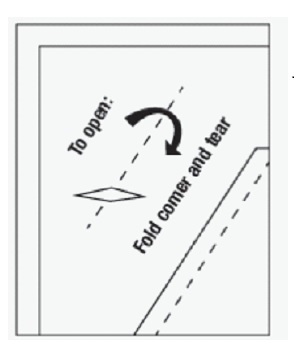
2. Sprinkle the entire contents of the SOLOSEC packet onto applesauce, yogurt or pudding. The granules will not dissolve. Take within 30 minutes without chewing or crunching the granules.
3. You can drink a glass of water after taking SOLOSEC to help with swallowing. You should not try to dissolve the medicine in water or any other liquid.
Even though you only take 1 packet of SOLOSEC, the medicine stays in your body and continues working for 4 days.
Important Information
- SOLOSEC may be taken before or after or during a meal.
- Take 1 entire packet of SOLOSEC at one time. Do not take only part of the medicine and save a portion for later.
- Store SOLOSEC at room temperature between 68°F to 77°F (20°C to 25°C).
- Keep SOLOSEC and all medications out of the reach of children.
This Patient Information and Instructions for Use have been approved by the US Food and Drug Administration. Revised: 06/2019
Manufactured for and Distributed by: Lupin Pharmaceuticals, Inc., Baltimore, MD 21202
© 2019 Symbiomix Therapeutics, LLC (A Lupin Company). All Rights Reserved Solosec® is a registered trademark of Symbiomix Therapeutics, LLC (A Lupin Company)
226679
-
PACKAGE LABEL.PRINCIPAL DISPLAY PANEL
Principal Display Panel - Individual Carton
solosec® 2g
secnidazole
NDC: 27437-051-01
Oral Granules
1 Unit-of-Use Packet
Rx Only
LUPIN PHARMACEUTICALS, INC.
USUAL DOSAGE: One packet.
Solosec®granules should be administered as follows:
- Sprinkle onto applesauce, yogurt or pudding. The granules will not dissolve. Consume all of the granules within 30 minutes.
- Consume the contents of one packet without chewing or crunching the granules.
- A glass of water may be taken to aid in swallowing.
- May be taken at any time with, before or after a meal.
Store at 20-25°C (68-77°F); excursions permitted to 15-30°C (59-86°F)
(See USP Controlled Room Temperature).
Manufactured for and Distributed by: Lupin Pharmaceuticals, Inc., Baltimore, MD 21202
© 2019 Symbiomix Therapeutics, LLC (A Lupin Company). All Rights Reserved
Solosec® is a registered trademark of Symbiomix Therapeutics, LLC (A Lupin Company)
Revised June 2019
Position pharmacy label over this panel
Product of Italy
solosec®2g
secnidazole
Rx Only
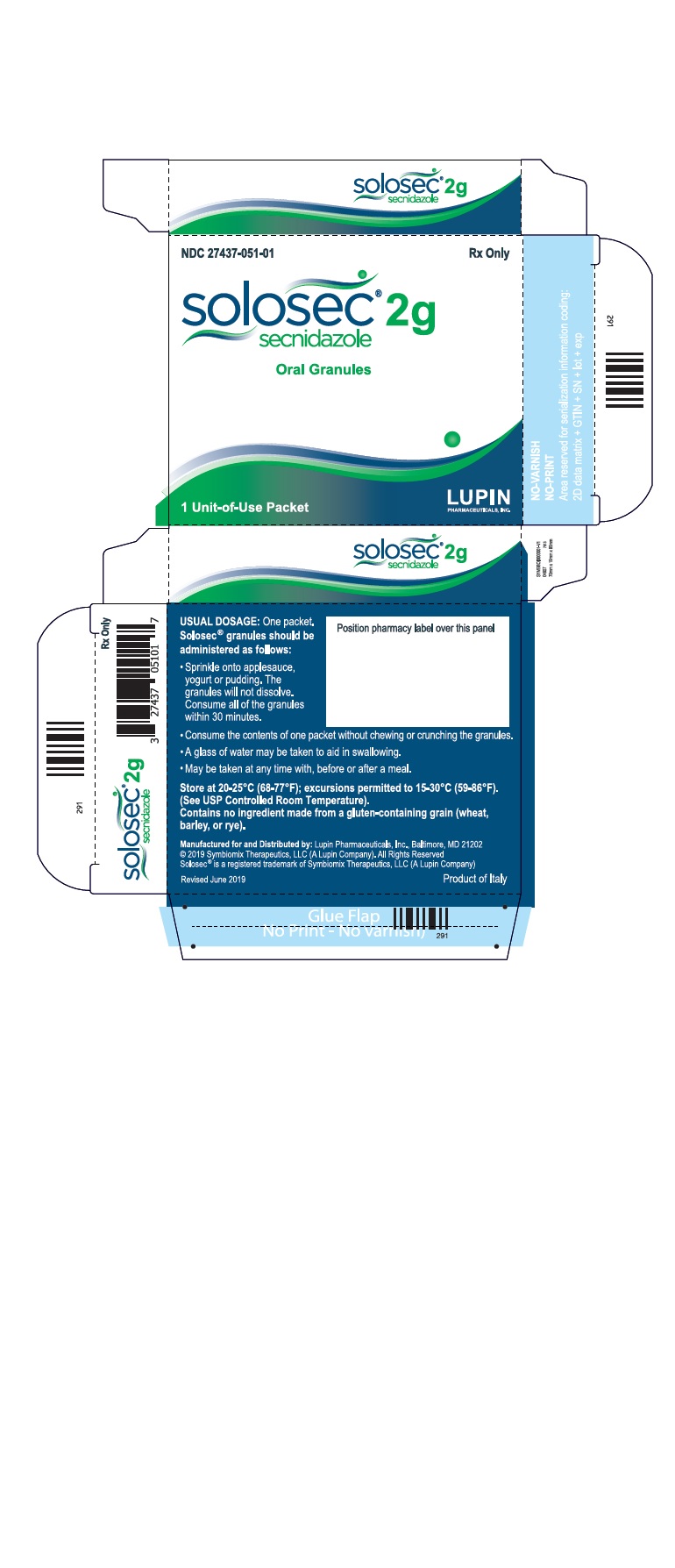
Principal Display Panel - Display Carton
USUAL DOSAGE: One packet.
Solosec® granules should be administered as follows:
- Sprinkle onto applesauce, yogurt or pudding. The granules will not dissolve. Consume all of the granules within 30 minutes.
- Consume the contents of one packet without chewing or crunching the granules.
- A glass of water may be taken to aid in swallowing.
- May be taken at any time with, before or after a meal.
Store at 20-25°C (68-77°F); excursions permitted to 15-30°C (59-86°F)
(See USP Controlled Room Temperature).
Manufactured for and Distributed by: Lupin Pharmaceuticals, Inc., Baltimore, MD 21202
© 2019 Symbiomix Therapeutics, LLC (A Lupin Company). All Rights Reserved
Solosec® is a registered trademark of Symbiomix Therapeutics, LLC (A Lupin Company)
Revised June 2019
Product of Italy
solosec® 2g
secnidazole
Oral Granules
Usual Dosage:
One 2 gram packet
Contains 12 individual cartons (NDC: 27437-051-01) which contain one Solosec packet.
Rx Only
LUPIN PHARMACEUTICALS, INC.
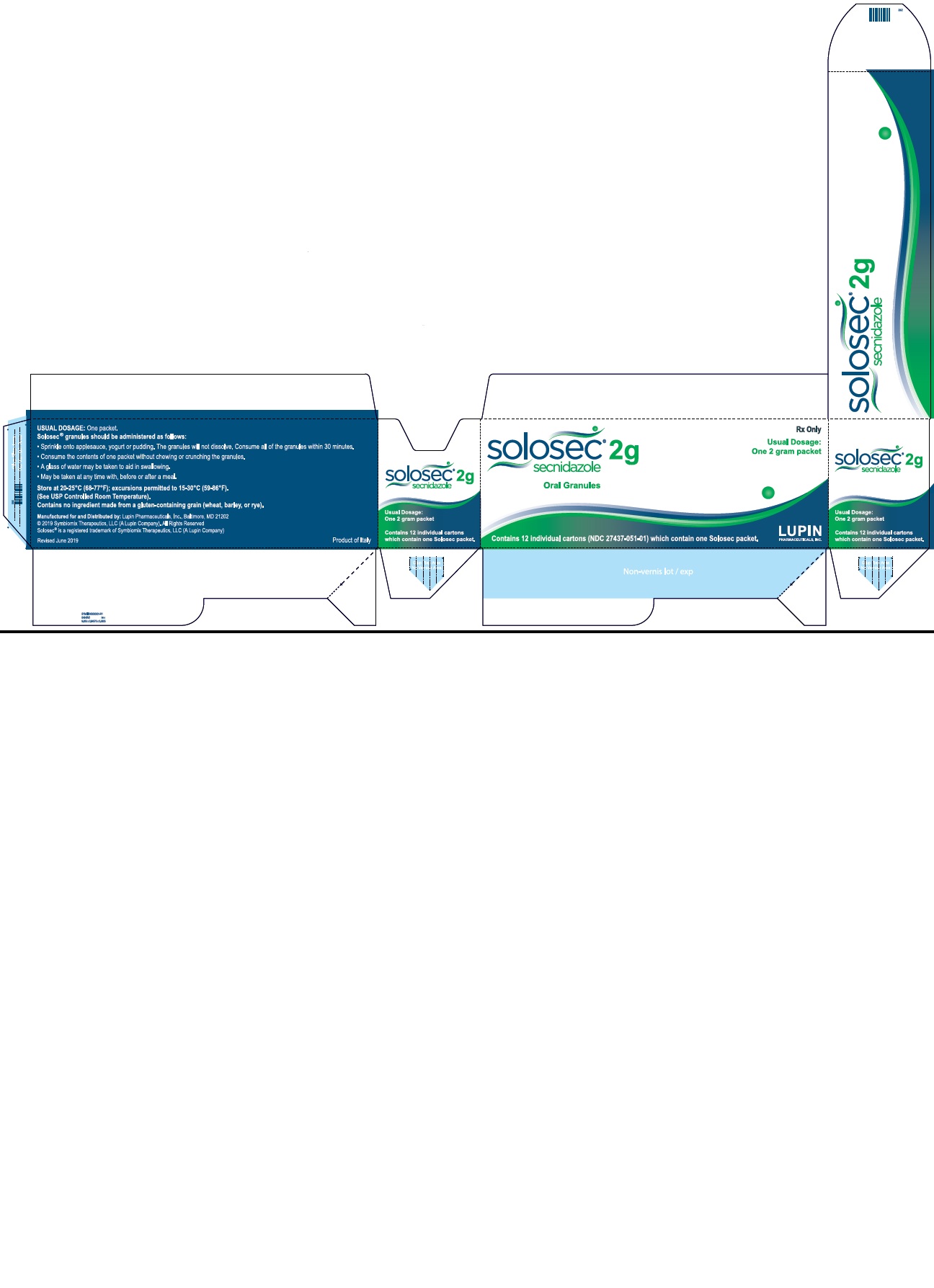
Principal Display Panel - Individual Packet
This packet is contained within
CARTON NDC: 27437-051-01
solosec®
secnidazole
2g
Oral Granules
Rx Only
LUPIN PHARMACEUTICALS, INC.
USUAL DOSAGE: One packet.
Solosec® granules should be administered as follows:
- Sprinkle onto applesauce, yogurt or pudding. The granules will not dissolve. Consume all of the granules within 30 minutes.
- Consume the contents of one packet without chewing or crunching the granules.
- A glass of water may be taken to aid in swallowing.
- May be taken at any time with, before or after a meal.
Store at 20-25°C (68-77°F); excursions permitted to 15-30°C (59-86°F). (See USP Controlled Room Temperature).
Mfd for and Distributed by: Lupin Pharmaceuticals, Inc., Baltimore, MD 21202
© 2019 Symbiomix Therapeutics, LLC (A Lupin Company). All Rights Reserved
Solosec® is a registered trademark of Symbiomix Therapeutics, LLC (A Lupin Company)
Revised June 2019
Product of Italy
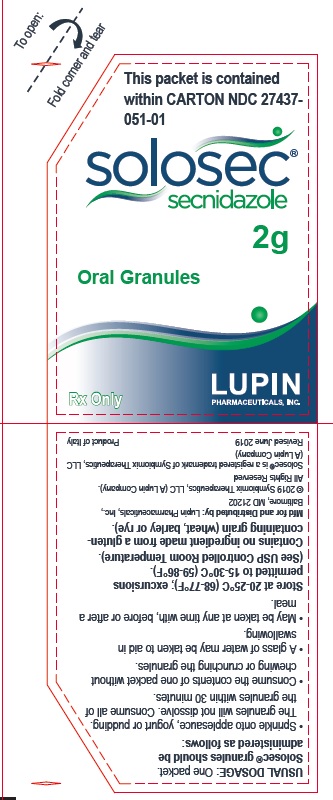
Principal Display Panel - Individual Carton
solosec® 2g
secnidazole
NDC: 27437-051-02
Oral Granules
PROFESSIONAL SAMPLE - NOT FOR SALE
1 Unit-of-Use Packet
Rx Only
LUPIN PHARMACEUTICALS, INC.
USUAL DOSAGE: One packet.
Solosec® granules should be administered as follows:
- Sprinkle onto applesauce, yogurt or pudding. The granules will not dissolve. Consume all of the granules within 30 minutes.
- Consume the contents of one packet without chewing or crunching the granules.
- A glass of water may be taken to aid in swallowing.
- May be taken at any time with, before or after a meal.
Store at 20-25°C (68-77°F); excursions permitted to 15-30°C (59-86°F)
(See USP Controlled Room Temperature).
Manufactured for and Distributed by: Lupin Pharmaceuticals, Inc., Baltimore, MD 21202
© 2019 Symbiomix Therapeutics, LLC (A Lupin Company). All Rights Reserved
Solosec® is a registered trademark of Symbiomix Therapeutics, LLC (A Lupin Company)
Revised June 2019
Position pharmacy label over this panel
Product of Italy
solosec®2g
secnidazole
Rx Only
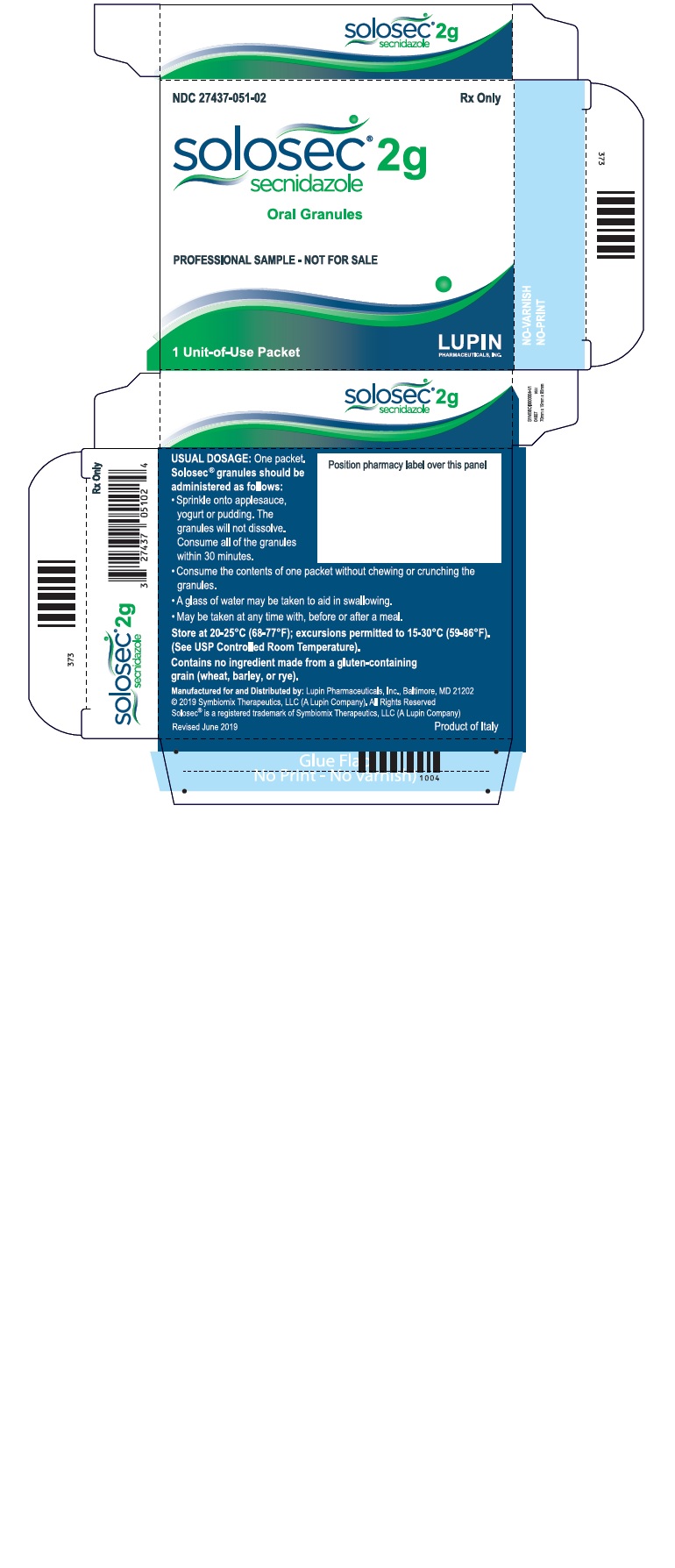
Principal Display Panel - Display Carton
USUAL DOSAGE: One packet.
Solosec® granules should be administered as follows:
- Sprinkle onto applesauce, yogurt or pudding. The granules will not dissolve. Consume all of the granules within 30 minutes.
- Consume the contents of one packet without chewing or crunching the granules.
- A glass of water may be taken to aid in swallowing.
- May be taken at any time with, before or after a meal.
Store at 20-25°C (68-77°F); excursions permitted to 15-30°C (59-86°F)
(See USP Controlled Room Temperature).
Manufactured for and Distributed by: Lupin Pharmaceuticals, Inc., Baltimore, MD 21202
© 2019 Symbiomix Therapeutics, LLC (A Lupin Company). All Rights Reserved
Solosec® is a registered trademark of Symbiomix Therapeutics, LLC (A Lupin Company)
Revised June 2019
Product of Italy
solosec® 2g
secnidazole
Oral Granules
PROFESSIONAL SAMPLE - NOT FOR SALE
Usual Dosage:
One 2 gram packet
Contains 5 individual cartons (NDC: 27437-051-02) which contain one Solosec packet.
Rx Only
LUPIN PHARMACEUTICALS, INC.
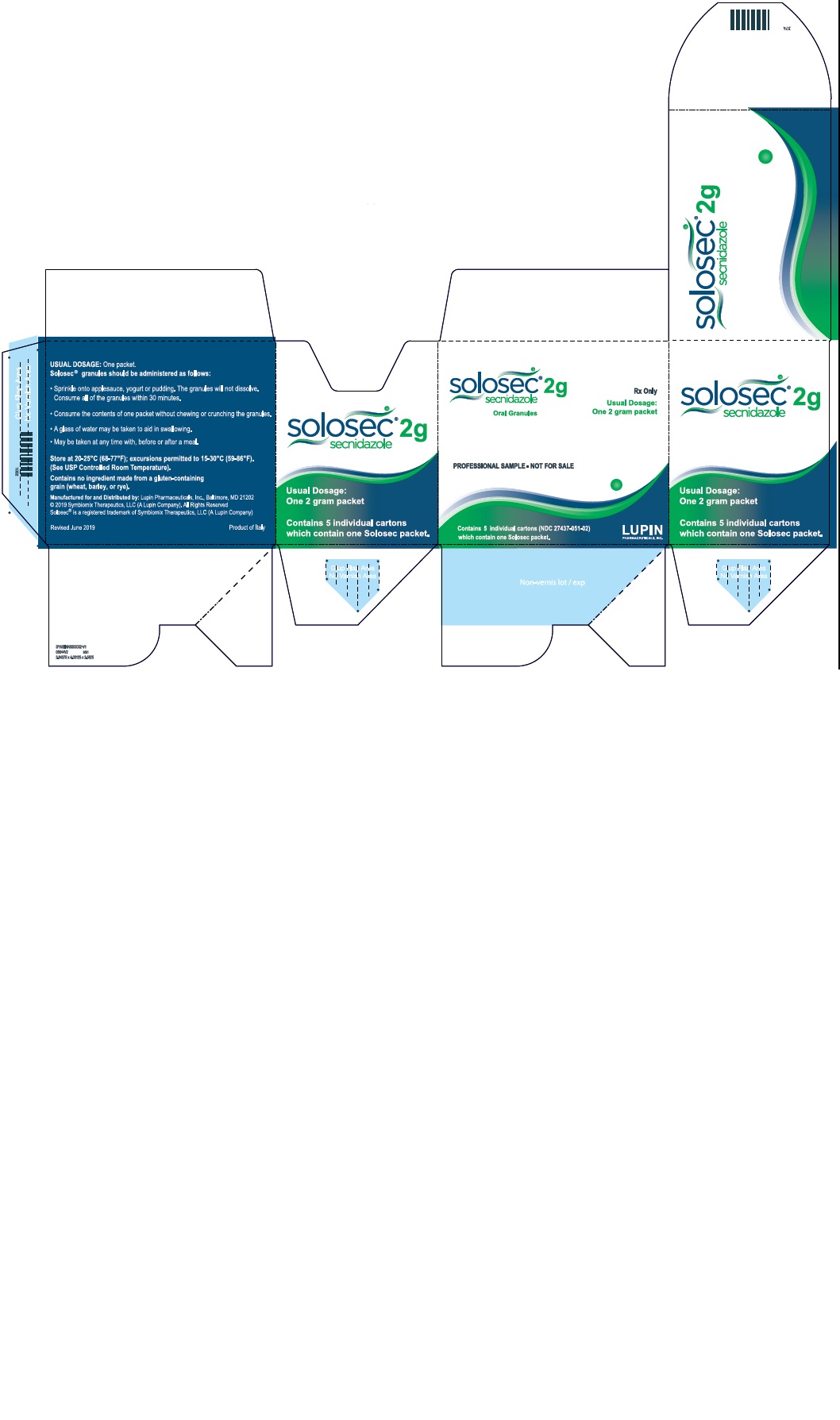
Principal Display Panel - Individual Packet
This packet is contained within
CARTON NDC: 27437-051-02
solosec®
secnidazole
2g
Oral Granules
PROFESSIONAL SAMPLE - NOT FOR SALE
Rx Only
LUPIN PHARMACEUTICALS, INC.
USUAL DOSAGE: One packet.
Solosec®granules should be administered as follows:
- Sprinkle onto applesauce, yogurt or pudding. The granules will not dissolve. Consume all of the granules within 30 minutes.
- Consume the contents of one packet without chewing or crunching the granules.
- A glass of water may be taken to aid in swallowing.
- May be taken at any time with, before or after a meal.
Store at 20-25°C (68-77°F); excursions permitted to 15-30°C (59-86°F). (See USP Controlled Room Temperature).
Mfd for and Distributed by: Lupin Pharmaceuticals, Inc., Baltimore, MD 21202
© 2019 Symbiomix Therapeutics, LLC (A Lupin Company). All Rights Reserved
Solosec® is a registered trademark of Symbiomix Therapeutics, LLC (A Lupin Company)
Revised June 2019
Product of Italy
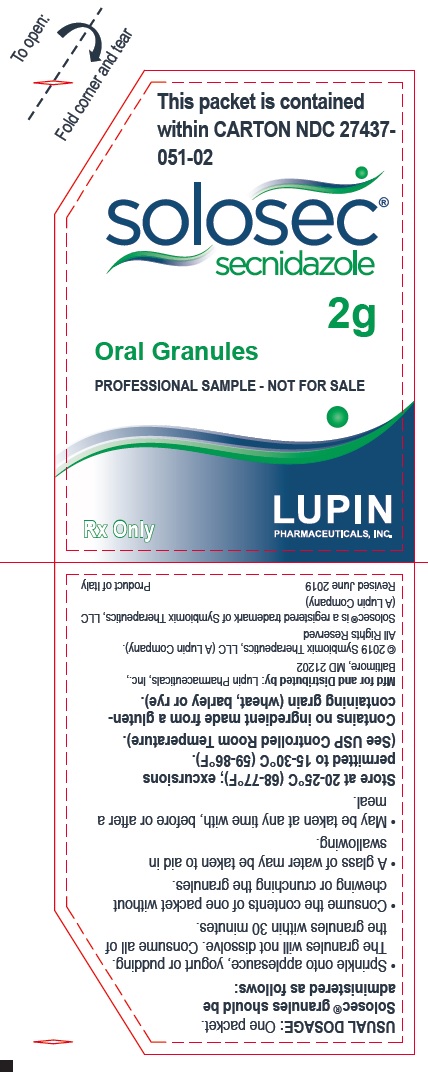
-
INGREDIENTS AND APPEARANCE
SOLOSEC
secnidazole granuleProduct Information Product Type HUMAN PRESCRIPTION DRUG Item Code (Source) NDC: 27437-051 Route of Administration ORAL Active Ingredient/Active Moiety Ingredient Name Basis of Strength Strength SECNIDAZOLE (UNII: R3459K699K) (SECNIDAZOLE - UNII:R3459K699K) SECNIDAZOLE 2 g in 4.8 g Inactive Ingredients Ingredient Name Strength ETHYL ACRYLATE AND METHYL METHACRYLATE COPOLYMER (2:1; 750000 MW) (UNII: P2OM2Q86BI) POLYETHYLENE GLYCOL 4000 (UNII: 4R4HFI6D95) POVIDONE, UNSPECIFIED (UNII: FZ989GH94E) SUCROSE (UNII: C151H8M554) TALC (UNII: 7SEV7J4R1U) Packaging # Item Code Package Description Marketing Start Date Marketing End Date 1 NDC: 27437-051-02 1 in 1 BOX, UNIT-DOSE 03/19/2019 1 2 g in 1 PACKET; Type 0: Not a Combination Product 2 NDC: 27437-051-01 1 in 1 BOX, UNIT-DOSE 10/30/2017 2 2 g in 1 PACKET; Type 0: Not a Combination Product Marketing Information Marketing Category Application Number or Monograph Citation Marketing Start Date Marketing End Date NDA NDA209363 10/30/2017 Labeler - Lupin Pharmaceuticals, Inc. (089153071) Registrant - LUPIN INC. (080038238) Establishment Name Address ID/FEI Business Operations Catalent Pharma Solutions, LLC 825745131 MANUFACTURE(27437-051) Establishment Name Address ID/FEI Business Operations Ropack Inc., 209989631 PACK(27437-051)
Trademark Results [SOLOSEC]
Mark Image Registration | Serial | Company Trademark Application Date |
|---|---|
 SOLOSEC 86696432 5498160 Live/Registered |
Symbiomix Therapeutics, LLC 2015-07-17 |
© 2026 FDA.report
This site is not affiliated with or endorsed by the FDA.